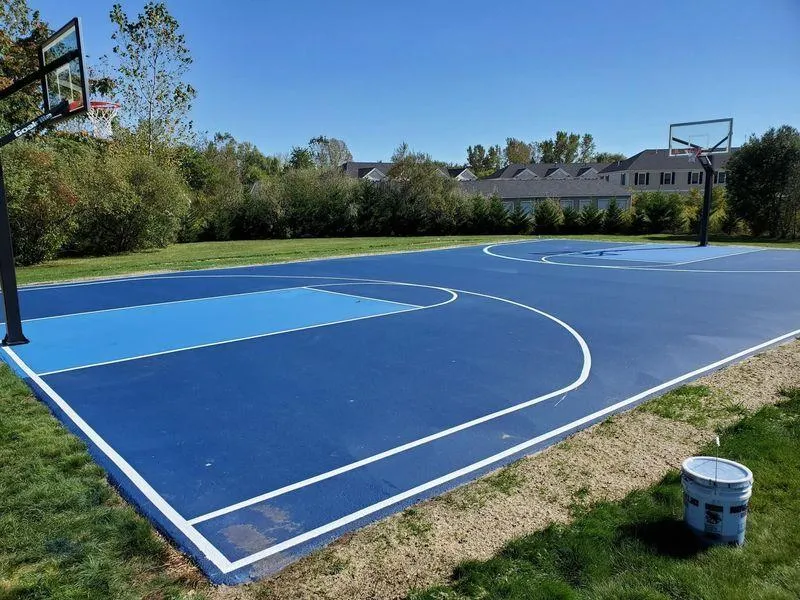Blog

Sport Court Paving: What Seekonk Clients Should Know Before Building
When Recreation Meets Engineering
Adding a sport court to your property—whether it’s for basketball, tennis, pickleball, or multi-sport use—is more than a backyard project. It’s an engineered surface that must balance playability, safety, and durability. For homeowners and facility managers in Seekonk, MA, the key to success isn’t the color of the lines—it’s what’s beneath them.
At All-Phase Asphalt Inc., we’ve paved hundreds of recreational courts across Southeastern Massachusetts since 1994. Over the years, we’ve seen one truth hold firm: a court is only as good as its base. Before you start building, here’s what you should know about getting it right the first time.The Real Foundation of a Good Sport Court
Asphalt sport courts are popular for a reason—they’re durable, cost-effective, and adaptable to different sports. But the way that asphalt is installed makes all the difference.
Why Asphalt Works for Athletic Surfaces
Consistent performance: A well-paved surface delivers predictable ball response and traction.
Weather resilience: Asphalt flexes slightly with temperature changes, ideal for New England’s freeze-thaw climate.
Low maintenance: With periodic resurfacing, asphalt courts can last 20 years or more.
Customizable: Ideal for acrylic coatings, color systems, and game-specific line layouts.
Still, asphalt must be engineered specifically for athletic use—not poured like a driveway or parking lot. That’s where professional design and grading come in.
How We Build a Sport Court That Performs
Each sport court project begins long before paving day. Our team combines site planning, structural precision, and sport-specific finishing to create a smooth, safe surface.
Step 1. Evaluating the Site
We look at the soil composition, drainage flow, and elevation. A flat backyard might look ideal but can hold water after rain. We plan the slope (typically 1%) to move water off the court without affecting gameplay.
Step 2. Excavation and Base Installation
We remove unstable soil and install a dense aggregate base, usually 6–8 inches deep. Each layer is compacted for structural integrity. This step prevents future depressions or cracks.
Step 3. Paving With a Fine-Graded Asphalt Mix
We use a special fine aggregate mix, smoother than driveway asphalt, to minimize surface irregularities. Each layer is compacted with precision rollers, achieving an even finish essential for consistent ball bounce.
Step 4. Curing and Coating
After curing (about 2–4 weeks depending on weather), we apply acrylic sport coatings. These coatings come in custom colors and add texture for grip. They also protect against UV rays and moisture.
Step 5. Layout and Line Striping
We stencil and paint lines according to regulation or custom dimensions. Whether it’s a full tennis layout or a multi-sport design, accuracy is key—especially for tournament-grade courts.
Key Decisions Before You Build
Clients in Seekonk often ask what they should decide before starting their court. Here are the main considerations that shape the project:
Purpose of the Court – Is it for basketball, tennis, or multi-use? Each sport needs specific space and surface texture.
Available Space and Orientation – Courts should face north–south to minimize sun glare.
Drainage and Location – Choose slightly elevated ground or allow for swales or drains
Color and Coating Options – Choose UV-stable coatings in matte finishes to reduce glare and slipping.
Maintenance Plan – Budget for recoating every 4–7 years, depending on play frequency.
The right preparation at the planning stage determines not only performance but also how long the court will look and feel brand-new.
FAQs About Sport Court Paving in Seekonk MA
How much space do I need for a backyard court?
A half basketball court can fit in about 25x45 feet; a full tennis court needs roughly 60x120 feet.
Can an existing driveway or lot be converted into a sport court?
Yes—if the surface is stable and drains correctly. We often resurface and re-grade existing asphalt for new courts.
What’s the ideal season to pave in Southeastern Massachusetts?
Late spring through early fall offers the right ground temperature for asphalt compaction and coating adhesion.
Do sport courts crack over time?
Minor hairline cracks can occur naturally. Regular sealcoating and maintenance prevent them from spreading.
How long will a professionally paved sport court last?
With proper care, an asphalt-based sport court can perform beautifully for 20+ years.
Why Seekonk Clients Trust All-Phase Asphalt
We’ve built private and community courts from Rehoboth to Swansea, and each project carries the same promise: precision, durability, and pride in workmanship. Our crews understand how Massachusetts weather affects materials, how base compaction determines bounce quality, and how the right slope keeps your surface playable year-round.
A sport court is an investment in recreation and property value. With the right paving partner, it’s also an investment that lasts.
Our Services
Helpful Links
License: RI 13328
© 2025 All Rights Reserved | All-Phase Asphalt Inc
